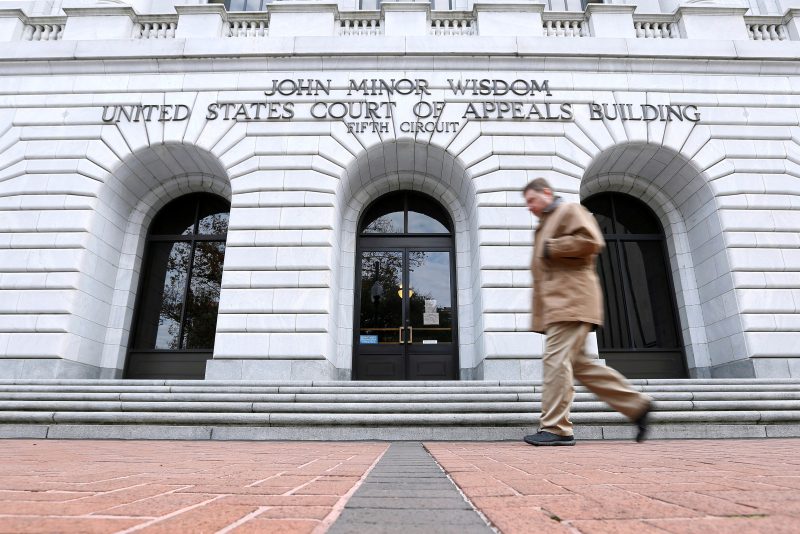The U.S. Court of Appeals for the 5th Circuit covers just three states: Texas, Louisiana and Mississippi. But it is having an outsize influence on the cases and controversies that reach the U.S. Supreme Court and testing the boundaries of the conservative legal movement’s ascendancy.
With a dozen judges nominated by Republican presidents, and only four by Democrats, the court is the favored launchpad for right-leaning politicians and organizations seeking groundbreaking judicial decisions restricting abortion, limiting guns laws, thwarting the ambitions of the Biden administration and curtailing the power of “administrative state” federal regulatory agencies.
“A meth lab of conservative grievance,” said New York University law professor Melissa Murray, a liberal who helps anchor a podcast about the Supreme Court called “Strict Scrutiny.” A recent episode described the 5th Circuit as an “American Idol” for conservative judges hoping to be noticed for a spot someday on the high court.
That would be fine with many on the right. On Wednesday night, the conservative Heritage Foundation honored one of the 5th Circuit’s most provocative members, Judge James C. Ho, with its Defender of the Constitution award. Ho was introduced as a former law clerk to Justice Clarence Thomas who might someday become his colleague — a suggestion that drew applause from the auditorium filled with lawyers, law students and fellow judges.
The 5th Circuit’s work is drawing more Supreme Court review than that of any other among the dozen regional appeals courts, which operate one step below the high court in distinct geographical regions. In the new term that began this month, the justices already have said they will review eight decisions from the New Orleans-based court. Twice in the past week, the Supreme Court agreed with emergency requests from the Biden administration to block 5th Circuit directives.
Again, a pattern: Of the 13 emergency requests for relief that President Biden’s solicitor general, Elizabeth B. Prelogar, has brought to the high court, 10 have arisen from the 5th Circuit, according to a list of “shadow docket” actions maintained by University of Texas law professor Steve Vladeck.
Raffi Melkonian, an attorney based in Houston who regularly appears before the 5th Circuit and closely tracks its work, said there is no question that some of the appeals court’s decisions have been out of step with the Supreme Court, which itself has a 6-3 conservative supermajority.
But, he said, “if you ask them, I think they would say, ‘Our obligation is to rule according to what we think the law is.’
“Maybe their view is, ‘If the Supreme Court wants to tell us to stop it, they will.’”
In one of Supreme Court’s recent actions, the justices sent a blunt message that the appeals and district courts had misread or ignored their order from August, which said that Biden administration regulations regarding “ghost guns” should remain in place for all while legal battles continue.
In another, they put on hold a 5th Circuit order that barred administration officials from contacting social media companies about removing information they consider misleading. The justices will decide the merits of the case this term.
Between 2019 and 2022, decisions from the 5th Circuit were reversed by the Supreme Court twice as often as they were affirmed, according to statistics compiled by Adam Feldman, who runs the Empirical SCOTUS blog. In the term that ended in June, the high court reversed all but two of the nine 5th Circuit rulings it reviewed.
The appeals court meets in the John Minor Wisdom courthouse in New Orleans, named for one of the judges whose decisions during the civil rights movement bolstered school desegregation efforts and voting rights. Its more modern history is conservative, and President Donald Trump reinforced that during his four-year term, nominating a half-dozen judges, many of them young and ambitious, with backgrounds working for Republican politicians in Texas and now regularly featured at Federalist Society events.
Because of the lopsided number of judges picked by Republican presidents, many of the 5th Circuit’s decisions being reviewed by the Supreme Court this term were issued by panels that included no Democratic-nominated judges. The rise in the share of the high court’s cases coming from the 5th Circuit tracks the arrival of Trump’s six picks on the appeals court, according to Feldman’s analysis.
University of Texas law professor Tara Leigh Grove, whose research specializes in the federal judiciary, said the 5th Circuit is in the thick of things in part because of cases being filed in recent years by conservative and litigious attorneys general in Texas — challenging the immigration policies of Democratic presidents, for instance, or regulatory directives from their administrations.
“What you see coming from the 5th Circuit are some huge decisions on important issues that are surprising enough and deal with big-enough issues that they wind up at the U.S. Supreme Court,” Grove said, adding, “I joke to my students that the 5th Circuit’s role sometimes is to make the Supreme Court look so much more moderate.”
In some of its cases, the lower court is reacting to Supreme Court decisions that themselves have moved American law in a new direction. Those decisions by the appeals court, in turn, may find their way back to Washington.
Next month, for example, the justices will consider the validity of a federal gun law that bars certain people subject to domestic-violence restraining orders from possessing weapons. The 5th Circuit struck down the statute earlier this year, finding it at odds with the Second Amendment and the high court’s 2022 ruling in New York State Rifle & Pistol Association v. Bruen.
In Bruen, Justice Clarence Thomas said gun restrictions violate the Second Amendment if they are not “consistent with the nation’s historical tradition of firearm regulation.” The court required governments to show that gun restrictions have proper analogies to the past.
Gun-control groups called the 5th Circuit decision on restraining orders outrageous. Prelogar, representing the federal government, said the Bruen decision does not require the “extraordinary conclusion that the Second Amendment prevents Congress and the States from disarming individuals whom courts have found to pose a specific threat of domestic violence.”
Groves said the 5th Circuit decision could be seen as simply an attempt to wrangle with the test the justices had imposed. When the appeals court invalidated the gun law, she said, it was essentially “holding up a mirror to the Supreme Court and saying, ‘This is what you wrought.’ … I’m not saying this is a good thing, but I don’t think the 5th Circuit is clearly to blame. It’s certainly a reasonable way to read what the Supreme Court said.”
Already this term, the high court has expressed doubt about another 5th Circuit decision that broke sharply with the past. The lower court said the funding mechanism Congress adopted to ensure the Consumer Financial Protection Bureau’s independence violated the Constitution. The ruling came from a panel of three Trump nominees: Judges Don R. Willett, Kurt D. Engelhardt and Cory T. Wilson.
Even some conservative justices expressed skepticism during oral arguments this month. Justice Elena Kagan, one of the court’s liberals, told the lawyer who was defending the lower court’s opinion, “You’re just flying in the face of 250 years of history.”
It’s not unusual for a court of appeals to be out of step with the Supreme Court. For years, the liberal U.S. Court of Appeals for the 9th Circuit, which covers a large swath of Western states, has seen its decisions overturned by a more conservative high court. The 9th Circuit was the favored locale for Democratic attorneys general and liberal organizations to challenge Trump administration policies.
What court observers find notable about the recent 5th Circuit cases is that they are being criticized by a Supreme Court that itself has moved to the right.
Justice Brett M. Kavanaugh wrote the court’s decision last term dismissing a challenge brought by conservative states to the Biden administration’s power to enforce certain immigration policies. He noted that federal courts have “not traditionally entertained that kind of lawsuit; indeed, the states cite no precedent for a lawsuit like this.”
While the court last term struck down Biden’s student loan forgiveness initiative in one case, it dismissed another lawsuit that had come from the 5th Circuit, saying it should not have been allowed to proceed. Justice Samuel A. Alito Jr. wrote the opinion for a unanimous court.
Many of the 5th Circuit cases to reach the Supreme Court follow a similar path. A conservative district court judge issues a sweeping opinion in response to a lawsuit filed by Republican state attorneys general or a conservative legal organization. That opinion is partially narrowed by the 5th Circuit, then temporarily blocked by the Supreme Court while it considers the merits.
Mifepristone: How did we get here?
1/5
End of carousel
The justices this term are almost certain to review one such 5th Circuit decision, which would restrict access to a widely used abortion medication first approved by the Food and Drug Administration more than two decades ago.
The challenge to the drug mifepristone, used in more than half of all abortions in the United States, was filed by an association of antiabortion doctors in a Texas court that is presided over by a single judge nominated by Trump. The judge, who has long-held antiabortion views, issued a ruling that suspended government approval of mifepristone — the first time a court had made such a decision for a drug used to treat humans — over objections from the FDA.
The 5th Circuit reversed some of the lower-court order but agreed to reinstate regulations on how mifepristone is prescribed and distributed. The Supreme Court then put that ruling on hold until the justices have an opportunity to resolve the issue.
Irv Gornstein, executive director of the Supreme Court Institute at Georgetown Law, said the court’s 2022 decision to eliminate the right to abortion had emboldened some conservative advocates to try to push the court’s jurisprudence to positions he predicted “at least some of the center bloc of conservatives aren’t going to be able to stomach.”
Some of the 5th Circuit’s decisions that will be reviewed this term may well be affirmed, Gornstein predicted — with a backhanded compliment.
“Not every one of them was delivered from Crazy Town,” he said. At the same time, “it would be shocking if at least some of those decisions are not reversed.”
In his speech at the Heritage Foundation on Wednesday, Ho, who was nominated by Trump, said he and others who employ an originalist reading of the Constitution are criticized by the “cultural elite” in ways that too often turns personal.
“We’re not just disagreeing in good faith about the proper meaning of legal terms — we’re fundamentally bad people who are too extreme for polite society,” Ho said in characterizing the opposition’s response. “We’re mean-spirited, racist, sexist, homophobic. We’re just trolling — or auditioning. We’re unethical, if not corrupt.”
NYU’s Murray, however, said it is Ho and others who mistake their criticism. “I don’t know that I’m necessarily of the elite left,” she said, “but I do know that the outputs of originalism often accrue to the disadvantage of those who are definitely not of the elite but are among the most disenfranchised groups in our society.”
Ho maintained that the “campaign of condemnation” is intentional. “There have been plenty of threats about packing the courts.,” he said Wednesday night. “But there’s no need to pack the courts when you can just pressure the courts and get the same result.”








